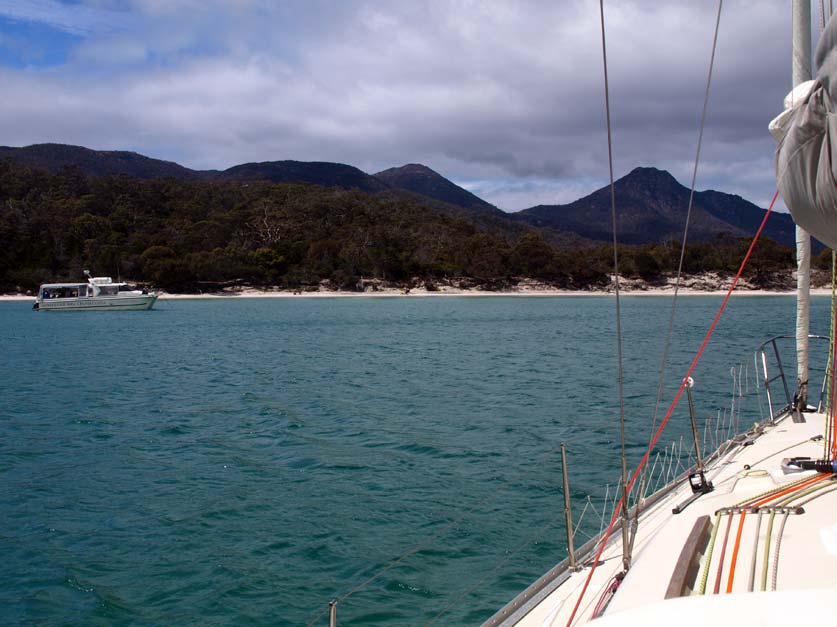The wind has been howling all night, the offshore waves frosting the water. I went to sleep early last night, but Robert and Aimee stayed up and landed sixteen arrowhead squid, my job is to clean them. Fortunately they are easier to clean than their Southern cousins, but the flesh is not as tender. I have attracted a large mob of seagulls and one little cormorant. The seagulls can take the scraps of gut on the surface, but the little cormorant out competes them by diving down to retrieve the squid heads. It quietly goes about gorging itself, its little webbed feet propelling it out of sight into the depths. Time and time again it retrieves the squid heads, I wonder where such a small bird can store so much squid?
A tourist boat turns up and a man jumps over the side into the frigid water. On the beach I spot several girls in bikinis sunning themselves. We’re rugged up in overalls and polar fleeces. The wind is freezing, coming up from the south west. What’s wrong with these people? They would have to be Tasmanians – or New Zealanders.
We weigh anchor and motor out of the bay into a two meter choppy sea. Fortunately it is following us. A pod of dolphins send us off, darting about under the boat as we raise the headsail and bear away around a group of rocks aptly named the Nuggets that guard the northern entrance to Wineglass Bay.
The day passes uneventfully. It takes until early afternoon for the mountains of the Freycinet Peninsular to eventually fade into the haze. Escapade surfs the swell, at one stage she makes 9.5 knots. The odd albatross glides by to check us out, its wings skimming the tips of the waves. The steep hills of the east coast fall into the sea, with ridge upon ridge folding into the Central Highlands.
In the late afternoon the wind dies down and we fire up the diesel. It is around this time the shearwaters appear every night. These amazing birds migrate all the way from the Aleutian Islands in the Bering Sea to rookeries on the coast of Tasmania and Victoria, nesting in burrows in the ground. There are estimated to be 285 colonies in south eastern Australia, the largest concentration being in Bass Strait. On Babel Island in the Ferneaux group there are estimated to be three million burrows. When Matthew Flinders sailed through Bass Strait in 1798 he noted the sky was black with shearwaters, estimating there to be one hundred million in one flock!
There are few anchorages on the north eastern shores of Tasmania. St Helens is the one port, and the bar at the entrance is so treacherous the harbour master provides a pilot to guide you in. We decide to motor past St Helens and spend the night in Skeleton Bay, at the southern end of the Bay of Fires. The problem is it will be after dark, and no-one on board has been there before. Its my turn to navigate. I plot a course inshore of a series of reefs, clearing the onshore reefs by around 300 meters, then pass by the entrance to St Helens, round Elephant Rock to the north, and then bear away to the east and south into Skeleton Bay. All goes to plan. Off Elephant Rock we lower the main sail in a rolling swell. It is as black as the guts of a cat. I can just make out land, and the spotlight is useless because there is a fine mist. A chart plotter is a handy device, but the electronic charts are unreliable, so I am busy reading the lat/longs and plotting them on the paper chart at the nav table and calling the headings up to Robert at the helm. The last few hundred meters are tense, we are relying on the depth contours. We can hear the surge of waves nearby, and drop anchor in 10 meters of water. The bay is only around 300 meters wide, so there is not a lot of swinging room, but the anchor holds. Its eleven o’clock, but I feel like something more than a cup of soup from a packet, so I fry some squid in panko and serve it with dark Chinese rice vinegar and a lettuce and tomato salad with a lime dressing. The boat rolls on a swell at anchor, and squadrons of very friendly mosquitos fly out from skeleton creek to welcome us. It is around 1.30 when we finally hit the sack.




